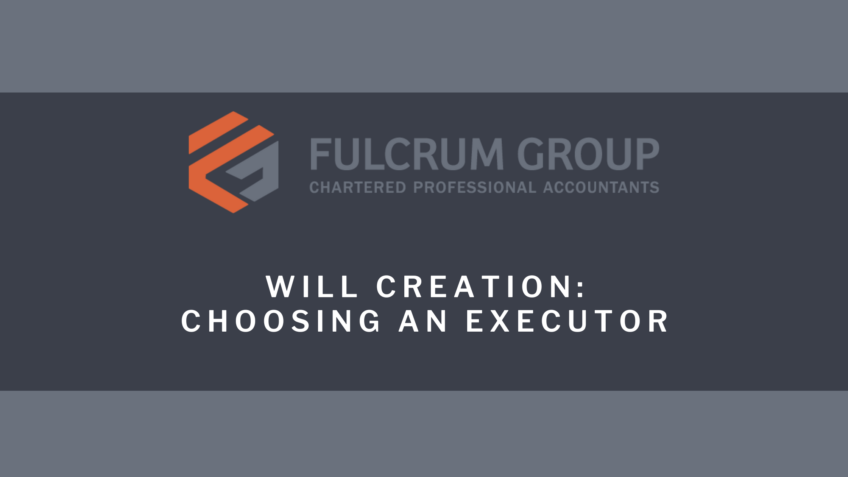Will Creation – Choosing an Executor
When preparing a will, one of the most important considerations is selecting an executor to administer your estate after you have passed away. Fulfilling the executor’s role is often complex and involves legal, financial, and tax planning decisions. A will can have more than one executor, and sometimes there are jointly appointed executors as in the case of multiple children being chosen to fulfill the role. Further, there are often replacement executors named in the case that the original executor is unable to fulfill their role. Additionally, there are several terms that are synonymous with the term executor, including executrix (feminine form), estate trustee, estate trustee with a will (Ontario), and liquidator in Quebec (Heath, 2023).
Duties of an executor:
There are several steps that the executor must perform upon the passing of an individual (Heath, 2023):
- The first requirement for an executor upon the death of the individual is to obtain a copy of the will itself. The will can often be found retained at a legal office, in an individual’s home, or in a secure deposit box. It is best practice for the location of the will to be communicated with the executor and the executor should be updated should the location change. Some provinces have official provincial will registries, but these are not mandatory.
- Upon locating and obtaining the will, the executor then must list the assets and liabilities of the deceased individual and apply for a grant of probate from the court. This grant of probate provides authority to the executor to administer the estate. Although probate may not be required in all situations, it is required when the assets of the deceased include accounts at financial institutions or real estate.
- Once authority to administer the estate is secured, the settling of the estate can commence. Financial institutions can be notified, assets can be sold, and debts, taxes, and other expenses can be paid. An executor’s job is completed once they distribute all assets to the beneficiaries and obtain releases from the beneficiaries.
Considerations for selecting an executor:
Some important considerations regarding the selection of an executor (Heath, 2023):
- Contentious family dynamics should be considered, as this may significantly impact the distribution of assets if there is disagreement amongst the next of kin regarding the selection of the executor.
- The age of the executor should be considered in relation to the person creating the will, as minor or disabled beneficiaries often will have assets held in trust for a certain amount of time or for the rest of the beneficiary’s life.
- Ensure that the chosen executor indeed wants to perform the role, as there is no obligation for the chosen executor to act.
- An executor should be made aware that although they are not liable for the debts of the deceased, they can still be held liable for errors or omissions they make when administering the estate. This can be mitigated by purchasing errors and omissions insurance.
- The executor should be informed that they may engage a third party for assistance regarding the administering of the estate, such as a lawyer or trust company. Further, the individual can name one of these third parties as the executor from the beginning, although this comes with additional costs for the added peace of mind.
Additional considerations:
There are also additional considerations for the executors themselves (Heath, 2023):
- An executor may charge executor fees that are dictated by provincial guidelines.
- In Alberta, the fee is based upon the size of the estate’s capital per the following:
- 3%-5% on the first $250,000 ($7,500 – $12,500)
- 2%-4% on the next $250,000 ($5,000 – $10,000)
- 5%-3% of the remaining amount
- The individual who creates a will can also specify executor compensation directly in the will itself.
- Typically, when the executor is a beneficiary, they may waive the executor fees as this is taxable income whereas the inheritance received from the estate is tax-free for the beneficiary.
Other general considerations and situations that arise may include (Heath, 2023):
- Typically, an estate is settled from a few months to a year. This timeline is heavily influenced by the complexity of the individuals’ assets and family dynamics.
- Dying without first creating a will is called dying intestate. There is a common misconception that when an individual dies intestate that the government keeps the entire estate. In actuality, the estate is distributed based upon the applicable provincial laws of intestacy with a pre-determined division schedule to the surviving next of kin. A family member can still apply to be administrator of the estate, and the administrator performs the same duties as the executor.
Choosing and executor for your estate requires careful consideration regarding the above points and should be undertaken with due care. Additionally, the executor should be made aware of their responsibilities and what may be required of them. Further, the executor should be made aware that should the job prove to be too complex for them, outside assistance can be engaged for a fee.
References
Heath, J. (2023, January 26). Here’s what you need to know about picking an executor for your will. Retrieved from FInancial Post: https://financialpost.com/personal-finance/family-finance/what-you-need-to-know-picking-executor-for-your-will

